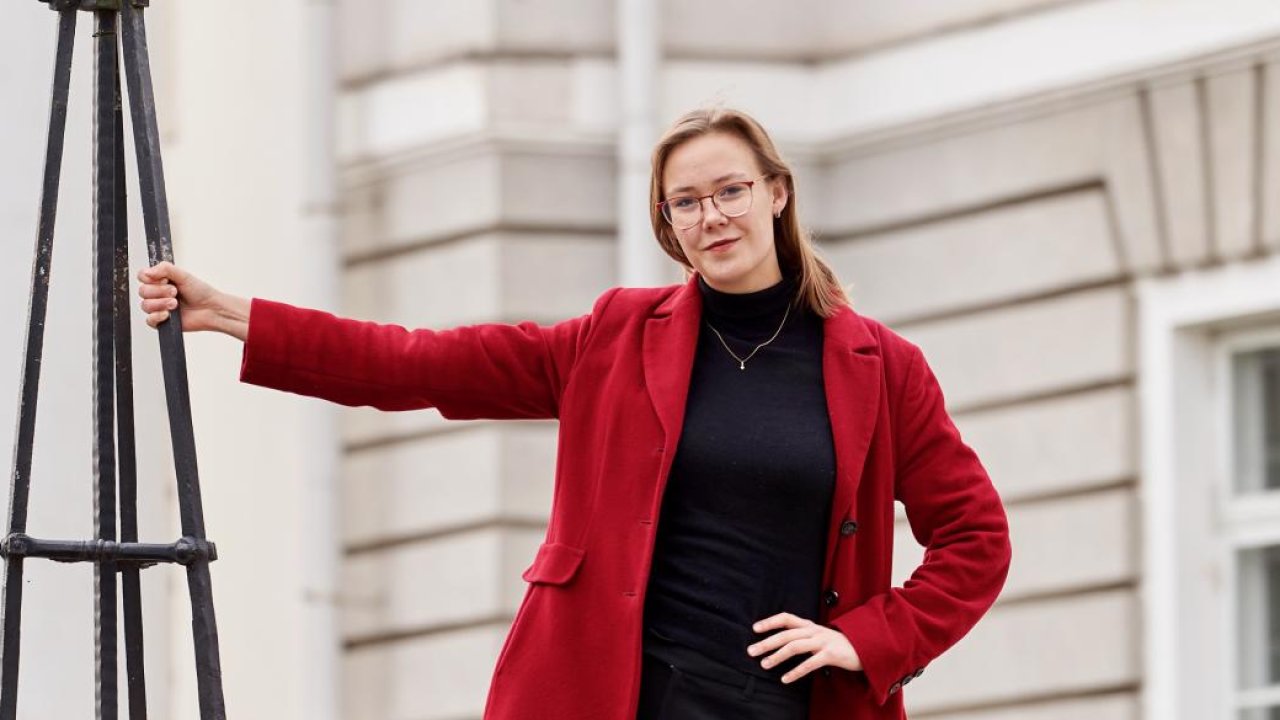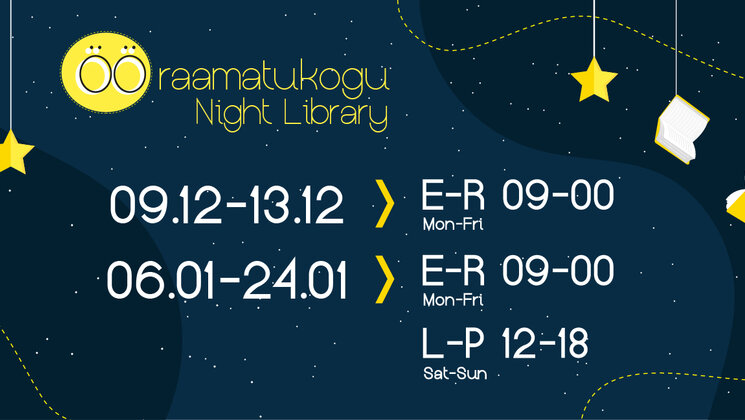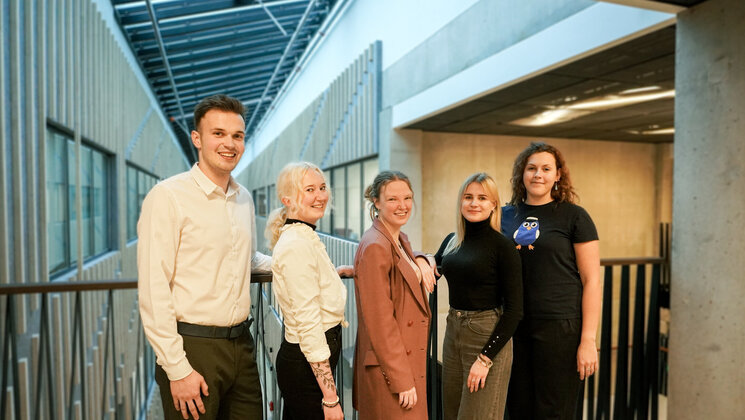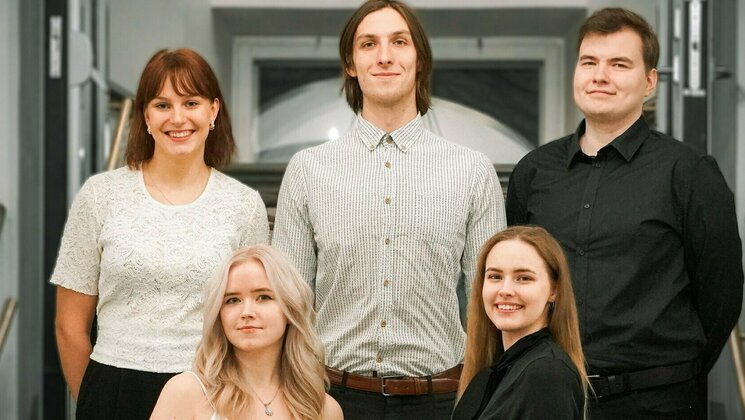President of the Student Union: “When the carriage house door is open, you may always come in!”

“Making a big change is like quietly carving a channel in the rock,” says Katariina Sofia Päts, a master’s student of history who heads the University of Tartu Student Union and is committed to making the students’ voices heard. How do students, the overwhelming majority of University of Tartu members – there are around 14,000 of them – live amidst all the current upheavals?
Katariina Sofia Päts, or Katariina, as everyone around her calls her, has just returned from a discussion organised by the Riigikogu’s Higher Education Support Group when we meet.
“I am grateful that students were finally invited to the table,” says Katariina. “Our presentations focused on supporting free higher education, but we also asked to address students’ basic needs.” She admits, however, that the only topic that resounded from the discussions was student loans – under what conditions they are granted and how to improve them. Arto Aas, Managing Director of the Estonian Employers’ Confederation, even said that students should be able to manage on their own. “This caused the atmosphere in the hall become heated,” says Katariina with a laugh. “Generally, everybody understands that the problem exists, yet it seems that little effort was made to take a fresh look at things. It was nice to be able to speak your mind, but it’s sad that nothing really changes.”
Still, she remains calm. “Well, making a greater change is like quietly carving a channel in the rock – my predecessors have said the same things, even though they were not invited to the Riigikogu. You have to be very patient.”
How are students coping now that life is a quarter more expensive than last year?
“It’s surely hard,” Katariina admits. “And it’s coded into student life – how many of us have had limitless possibilities when starting to live on our own? You can’t support yourself without a job.”
Working during master’s studies is not so bad; your work can be related to the specialisation, says Katariina, but she is worried about those who have just started their bachelor’s studies. “This is when a lot of difficult things happen: about 90% of the students come from outside Tartu, to a new environment, new people, a new system, and the issue of livelihood,” she says. “A very difficult beginning can be a blow to your mental health.”
Affordable food for students
The students’ petition against the high prices in the university library café made it even to the columns of Tartu Postimees. It sparked a social media outcry, “Students only demand and are not doing anything. Why don’t they do it themselves!”
“When I first came to Tartu in 2017, the lunch offer cost 3.70 on average. These days it is more like six euros,” says the student union leader. She does not think anyone is really starving, and the dorms have cooking facilities, although no one has time to cook three hot meals a day. But there are no cheap student canteens.
“The affordable student lunch initiative came from Isabel Jezierska, a master’s student in political science, and Tartu Analytica – a group of friends, students and doctoral students, who all have also studied abroad,” Katariina explains.
The protest became more formal: a meeting was convened between members of the Rector’s Office, the petitioners and the student union.
“We discussed the core of the problem, how cheaper student canteens work in other countries and what we could do,” Katariina says. “The message of the Rector’s Office was that the university cannot force its catering partners to offer cheap food. The law also limits the granting of competitive advantages. When we look into other countries’ experiences, an excellent example is the University of Helsinki and Finland generally – for several decades, they have had the same system in place for school meals. They have a nationally fixed lunch price, and the state pays more than half of it. The price for the end consumer is lower because the state subsidises it. We don’t have that in Estonia.”
Negotiations with Hugo Treffner Gymnasium led to an agreement to offer lunch at a reduced price to university students after the school’s lunch hour. The student canteen was opened as a pilot project on 12 October. On the opening day, the canteen was packed with people, with prices of €3.50 for a regular meal and €4.20 for a larger portion. Unfortunately, the number of regular customers remained lower than expected, as the limited opening hours were unsuitable for the students scattered around the city. On 28 October, it was decided to end the pilot project because of legal problems that had arisen. “We have to think how to move on,” Katariina says.
In addition, students want to cooperate with Food Bank and the volunteer movement Foodsharing, who has foodsharing points located all over Tartu. The first student-oriented point will be located next to the front door of the dormitory on Purde street. Volunteers will bring food with an imminent expiry date there from the shops, but everyone else can also donate food to the cabinets which will also be available for city residents.
University as a giant beehive
Katariina is clearly in her element when she is communicating and organising. “As president of the student union, I’ve seen how the university works from the inside, and it’s been really fascinating,” she admits. “I’ve always been a bit worried that, because the university is such a huge institution, students’ connections with the university are weak, to say the least. Some courses mentioned Rector Parrot and a few others, but the story you step into as a student is incredible!”
Katariina wrote her bachelor’s thesis on the transition to an Estonian-language education system in the Republic of Estonia in 1919. “I’m still amazed that this happened in the middle of the Estonian War of Independence!” she exclaims. “And then I think how it cannot be done now ... I went to the Tallinn Secondary School of Science where we were told our school’s story day in day out and taught our responsibilities as members of the school and society. It was odd to realise that very little of that is being done at university.”
After a year at the helm of UTSU, Katariina says she feels much more like a member of the university. She has tried to familiarise herself as much as possible with what the student union means and what it actually does. “For me, it is important to ensure that UTSU is more visible among students, that we are important and necessary for students. When the carriage house door is open, you can always come in, have a cup of coffee and a chat.” (The former carriage house next to the university’s café is now home to the student union.)
These are not just words – the student union has tried to make itself visible and heard in critical situations.
“When the coronavirus vaccines came out, we took the first step to make it known where we stood on the issue,” explains the student union president. “We invited all students to vaccinate, and got together with the student organisations and the communication people in the main building for the first time in a long time. We had a common problem and needed to tackle it together.” No one knew then how many students had been vaccinated. “We had no idea how big the problem really was, and we launched quite an intensive campaign to invite students to get the shot; we also organised vaccination buses. When the data came back last October, it turned out that about 90 per cent of our students had been vaccinated, which was a huge relief.”
Katariina joined the students’ representative body already in the spring of her first year. For a year, she was the representative of her institute, then for a year the faculty’s representative or a member of the student parliament, and then for a year in the monitoring committee. She had no intention of becoming the leader of UTSU. “I applied to be an exchange student in Toronto instead, in connection with my thesis,” she says. “When I couldn’t go there, I was a bit upset and miserable, but then a good friend suggested I might run for the president of UTSU. I thought I probably wouldn’t forgive myself if I didn’t try.”
Katariina has nothing but good things to say about the current board. “Everyone is working with heart and soul for the student body. Hanna-Britt Soots is a doctoral student dealing with academic affairs. The second vice president is Siret Siim, a bachelor’s student in Government and Politics – she is in charge of the union’s internal development and external cooperation projects.”
They have had plenty of work. The outbreak of the war in Ukraine left no one untouched, and the students took action. “We immediately realised that we had a space in the city centre, but the Red Cross and other relief organisations lacked logistics,” Katariina says.
On 26 February, University of Tartu students opened their humanitarian aid point. “We kept it open for a week until the relief organisations got off the ground. We had an excellent logistical chain with a Tartu company, who sent us a video afterwards: your parcels have arrived in Ukraine! We sent out 160 big boxes of humanitarian aid.”
Katariina admits that it was a touching moment when the student organisations awakened and revealed their most beautiful side. “EÜS (Estonian Students’ Society) opened a big collection point, [Fraternity] Ugala immediately started collecting food aid, and many others too. Later the work was handed over to aid organisations, but our student union helped to overcome the most difficult moment. I was very proud of the student organisations.”
Family legacy
There are several generations of lawyers in Katariina Sofia Päts’ family. Her father, Madis Päts, is a University of Tartu-educated attorney-at-law, her grandfather Matti Päts is an expert in industrial property law, and also her great-grandfather Viktor and great-great-grandfather Konstantin Päts were lawyers.
Katariina, on the other hand, showed a bit of rebellion and decided to choose history.
One can imagine that, because of her surname, she has to constantly answer the question of how being President Konstantin Päts’ great-granddaughter has affected her life.
Katariina is ready for the question. “It affects my life through that everyone is always asking how it affects my life (laughs). I was born with this name, I don’t know any other life. I don’t know how much I am influenced by Old Konstantin himself. I understand that he has been a realm of memory for people’s hopes and feelings, and his name inevitably provokes some kind of reaction. I can’t really forget it, but my great-great-grandfather influences my personal life only through my grandfather, because I myself never met him.”
“On the political side, I am not responsible for my predecessors’ thoughts and actions,” she says, convinced. “But his fate, the fact that only my grandfather Matti and his mother were left of the whole extended family, has made our family small on the one hand, and very close on the other.”
Katariina grew up on the same Kloostrimetsa farm where her great-great-grandparents lived. “We moved there in 1991 and lived there, three generations together. We have strong family traditions that have very clearly framed my life. This has given me confidence – I know I have a very strong safety net around me.”
There was a lot of talk about history in Katariina’s home. “All these stories are very vivid for me,” she says. “The story of my grandfather, the story of our family throughout the Soviet period – it is with us; it is entwined with everything. We have generations and generations of family friends and acquaintances; this network is always around me, and, in that sense, history is very much alive. I’ve always known my place, in a good way.”
On the other hand, it has also made her careful. “I understand very well that whatever I do or say, it has my name signed to it,” Katariina says. “I don’t think about it all the time, but I understand that my name is automatically associated with my family.”
Look to the future
Katariina is not sure what she will do in the future. “I’ve never made plans in Excel,” she says with a laugh. However, she feels it would not be suitable for her as a historian to focus on the period of her great-great-grandfather’s life. So for her master’s thesis, she is instead studying expatriate Estonians in Canada and their political activities during the restoration of Estonian independence.
How would Katariina like to see Estonia in 20 years, in 2042?
She is thinking carefully. “I think that what I would like to see and what Estonia will be like then may not fully coincide,” she admits. “What matters is how we manage to maintain actual equality in society. At the moment, gaps are opening up in many places and there tends to be some hiding in trenches. It is essential to overcome this to survive as a small country. To be whole internally and take this country forward. I think that the lines of force will be played around in the world over the next couple of decades, and I’m not sure whether it will be in a direction favourable to Estonia. I want to hope for the best, but there are big chasms and pitfalls ahead, and it doesn’t only depend on us whether we can come out of them successfully.”
Coin-jingling students
One of the student union’s most demanding projects was organising the demonstration to support higher education funding in August.
“Higher education funding is a big and complex issue,” says Katariina. “Maybe it doesn’t bother you as a student every day, yet it is critical to have good lecturers. At the end of last year, at a Rector’s Office meeting, the rector asked, where are those student rebellions of the 60s? Why are the students not on the streets? This question somehow stuck with me.”
The demonstration was a success. The academic year was opened in front of the university’s main building, and the whole street was full of people. The idea of jingling the coins was developed by the performing arts students of Viljandi Culture Academy. “The logic was simple: you need to give a voice to as many people as possible, but in a way that no one feels alone and personified in the protester’s role,” says Katariina.
“For several weeks, we tested how the coins sounded best, whether in a glass or a tin can. Kuno Kerge, the conductor of the Tartu Academic Male Choir, was also inspired by the idea of a demonstration. How the jingling, the speech and the music all blended together – I still can’t believe that it all came together so well. It was a risk, but I’m glad it worked out. Afterwards, students even approached me on the street and thanked me, people I knew wrote to me and, amazingly, the press was interested.”
Tiia Kõnnussaar
UT Executive Editor
The article was originally published in the journal Universitas Tartuensis.






